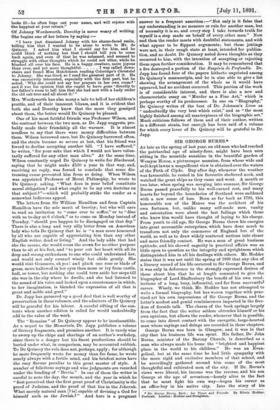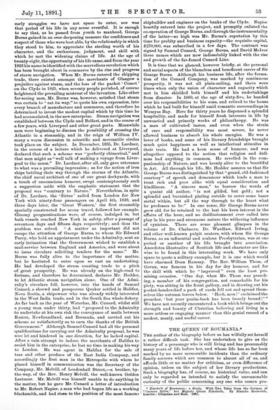SIR GEORGE BURNS.* As late as the spring of last
year, an old man who had reached the patriarchal age of ninety-four, might have been seen sitting in the noontide sunshine in the beautiful garden of Wemyss House, a picturesque mansion, from whose wide and well-kept lawns a magnificent view is obtained over the waters of the Firth of Clyde. Day after day, whenever the weather was favourable, he rested in his favourite sheltered nook, and watched the great ships as they came and went. A month or two later, when spring was merging into summer, Sir George Burns passed peacefully to his well-earned rest, and many hearts far beyond the boundaries of Scotland were saddened with a new sense of loss. Born as far back as 1795, this honourable son of the Manse was the architect of his own fortunes, but, unlike many self-made men, vanity and ostentation were about the last failings which those who knew him would have thought of laying to his charge. From youth to old age, Sir George Burns threw his energies into great mercantile enterprises, which have done much to transform not only the commerce of England but of the world, as well as to draw widely scattered nations into closer and more friendly contact. He was a man of great business aptitude, and his shrewd sagacity in practical affairs was as little open to question as the integrity and uprightness which distinguished him in all his dealings with others. Mr. Hodder states that it was not until the spring of 1888 that any idea of a literary record of his life occurred to Sir George Burns, and it was only in deference to the strongly expressed desires of those about him that he at length consented to give the biographer of Lord Shaftesbury the benefit of his own recol- lections of a long, busy, influential, and far from uneventful career. Wisely, we think, Mr. Hodder has not attempted to write a formal biography, but has woven together with prac- tised art his own impressions of Sir George Burns, and the latter's modest and genial reminiscences imparted in the free- dom of fireside talk. The charm of the book springs largely from the fact that the writer seldom obtrudes himself or his own opinions, but allows the reader, whenever that is possible, to come into direct contact with the energetic, large-hearted man whose sayings and doings are recorded in these chapters.
George Barns was born in Glasgow, and it was in that city that his business life was spent. His father, Dr. John Burns, minister of the Barony Church, is described as a man who always made his home the "brightest and happiest place in the world to his children." He was an Evan- gelical, but at the same time he had little sympathy with the more rigid and exclusive members of that school, and he accordingly gathered around him some of the most thoughtful and cultivated men of the city. If Dr. Burns's views were liberal, his income was the reverse, and his son George at the age of seventeen—keenly alive to the fact that he must fight his own way—began his career as an office-boy in his native city. Into the story of his
• Sir George Burns, Ban.: his Times and Friends. By Edwin Hodder. Portrait. London : Hodder and Stoughton.
early struggles we have not space to enter, nor was that period of his life in any sense eventful. It is enough to say that, as he passed from youth to manhood, George Burns gained in an ever-deepening measure the confidence and respect of those who were best able, by the relationship in which they stood to him, to appreciate the sterling worth of his character, and the enthusiasm, judgment, and skill with which he met the widening claims of life. At the age of twenty-eight, the opportunity of his life came, and from the year 1823 his name is identified with the marvellous revolution which has been brought shoat in commerce by the rise and progress of steam navigation. When Mr. Burns entered the shipping trade, there existed amongst the . merchants of Glasgow a prejudice against steam, and the loss of the packet Comet' on the Clyde in 1825, when seventy people perished, of course heightened the prevailing mistrust of the invention. Like other far-seeing men, Mr. Burns was, however, satisfied that steam was certain to "eat its way," to quote his own expression, into every branch of manufacture and commerce, and therefore he determined to invest the modest capital which by this time he had accumulated, in the new enterprise. Steam navigation was established between the Clyde and Belfast, and in the course of a few years, with Liverpool and other great ports. Meanwhile men were beginning to discuss the possibility of crossing the Atlantic in a steamship, and in the reign of William IV. many a warm discussion in scientific and mercantile circles took place on the subject. In December, 1835, Dr. Lardner, in the course of a lecture which he delivered at Liverpool, declared that such a scheme was "perfectly chimerical," and that men might as "well talk of making a voyage from Liver- pool to the moon." Dr. Lardner, after all, only gave utterance to what was a prevailing impression ; as for the notion of iron ships battling their way through the storms of the Atlantic, the chief naval architect of one of our great dockyards, with a touch of unconscious humour, swept contemptuously such a suggestion aside with the emphatic statement that the proposal was "contrary to Nature." Nevertheless, in spite of Dr. Lardner, the 'Sirius' sailed from London for New York with ninety-four passengers on April 4th, 1838, and three days later, the Great Western,' the first steamship specially constructed for ocean travel, followed her example. Gloomy prognostications were, of course, indulged in, but both vessels reached New York in safety, after a passage of seventeen days and fifteen days respectively; and thus the problem was solved. "A matter so important did not escape the attention of George Burns, to whom Sir Edward Parry, who held an appointment under the Admiralty, sent an early intimation that the Government wished to establish a mail-service between England and America, and were about to issue circulars soliciting tenders for the same." Mr. Burns was fully alive to the importance of the matter, but he hesitated to enter upon so vast an undertaking. He had developed the steam coasting trade to a pitch of great prosperity. He was already on the high-road to fortune, and therefore he determined, declares Mr. Hodder, to let Atlantic steam navigation alone. One of the Admi- ralty's circulars fell, however, into the hands of Samuel Cunard, a shrewd and prosperous Quaker settled in Halifax, Nova Scotia, a shipowner who was already widely interested in the West India trade, and in the South Sea whale-fishery. As far back as the year of Waterloo, Mr. Cunard, whilst still a young man under thirty, had "proposed to the Admiralty to undertake at his own risk the conveyance of mails between Boston, Newfoundland, and Bermuda, and carried out his scheme so satisfactorily as to earn the thanks of the British Government." Although Samuel Cunard had all the personal qualifications for carrying out the Admiralty proposal, he was sore let and hindered in one direction, for he lacked capital. After a vain attempt to induce the merchants of Halifax to assist him in the enterprise, he lost no time in making his way to London. He was agent in Halifax for the sale of teas and other produce of the East India Company, and accordingly the first man in the Metropolis with whom he placed himself in communication was the Secretary of the 'Company, Mr. Melvin, of Leadenhall Street,—a brother, by- the-way, of the Rev. Henry Melvin, the well-known Golden Lecturer. Mr. Melvin was himself unable to do anything in the matter, but he gave Mr. Cunard a letter of introduction to Mr. Robert Napier, a man who had begun life as a working blacksmith, and had risen to the position of the most famous shipbuilder and engineer on the banks of the Clyde. Napier heartily entered into the project, and promptly enlisted the co-operation of George Burns, and through the instrumentality of the latter—so high was Mr. Burns's .reputation by this time for probity and business capacity—the requisite capital, £270,000, was subscribed in a few days. The contract was signed by Samuel Cunard, George Burns, and David McIver three names which are now indissolubly linked with the rise and growth of the far-famed Cunard Line.
It is time that we glanced, however briefly, at the personal and social aspects of the blameless and beneficent career of Sir George Burns. Although his business life, after the forma- tion of the Cunard Company, was marked by continuous prosperity, it was not all plain-sailing, and there were times when only the union of character and capacity which met in him shielded both himself and his undertakings from disaster. In 1860, at the age of sixty-five, he handed over his responsibilities to his sons, and retired to the house which he had built for himself amid romantic surroundings in Wemyss Bay. Here for thirty years he dispensed a splendid hospitality, and made for himself fresh interests in life by unwearied and princely works of philanthropy. He was a man of cultivated tastes, and even when the strain of care and responsibility was most severe, he never allowed business to absorb his whole energies. He was a lover of books, and some of his literary friendships brought much quiet happiness as well as intellectual stimulus in their train. He had a keen sense of humour, and was altogether opposed to the notion that religion and dull- ness had anything in common. He revelled in the com- panionship of Nature, and was keenly alive to the beautiful in Art. All through his life, Mr. Hodder assures us that Sir George Burns was distinguished by that "grand, old-fashioned courtesy" of speech and demeanour which leads a man to treat rich and poor alike with equal consideration and kindliness. "A sincere man," to borrow the words of a quaint old author, "is not gilded, but gold ; not a splendid and burnished plating outside to cover some baser metal within, but all the way through to the heart what he professes to be." In one sense, Sir George Burns never grew old, for he retained to the last his keen interest in the affairs of the hour, and no disillusionment ever called into play in his pure and strenuous nature the withering influence of cynicism. There are some pleasant glimpses in the volume of Dr. Chalmers, Dr. Wardlaw, Edward Irving, and other well-known pulpit orators, with whom Sir George Burns, as an influential and zealous Presbyterian, was at one period or another of his life brought into association. Anecdotes illustrative of Scottish life and character are like- wise to be found in this interesting work. We have only space to quote a solitary example, but it is one which would have charmed Dean Ramsay. The Rev. William Thom, of Govan, was famous in his day for dry humour, and for the skill with which he " improved " even the least pro- mising occasion. "One day, when Mr. Thom was preach- ing, a member of his congregation, not remarkable for his piety, was sitting in the front gallery, and in drawing out his pocket-handerchief a pack of cards fell out and spread them- selves like autumn leaves below. Hech, mon !' exclaimed the preacher, bat your psalm-book has been loosely bound !" We have not recently encountered a book which brings out the strength and beauty of Christian believing and living in a more artless or engaging manner than this genial record of a modest, manly, and useful career.



































 Previous page
Previous page